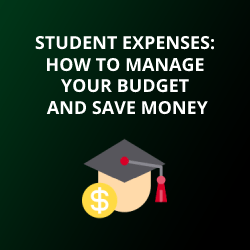Most people, having their own income, obtaining a scholarship, or getting money from their parents, don’t even think about creating any budget.
They don’t plan their expenses and go shopping when it’s necessary.
So it’s not surprising that people run out of cash earlier than they expected.
Unfortunately, many people lack knowledge of how to manage money.
Financial literacy should be a compulsory subject in schools in the modern world, but education authorities are reluctant to introduce it in the general education curriculum.
Therefore, students and all other categories of people who want to manage their money wisely have to search for information on the Internet.
It’s considered that students always lack money, but we are sure that it’s a stereotype caused by the lack of understanding of what the budget is and why it is necessary.
If you’re studying in college and fail to have enough money to buy everything you need, the problem may be with your habits.
However, you got interested in budgeting, and it’s already a step towards an adult and responsible life.
When you have a budget, you know where your money goes, how much expenses are wasted.
Budgeting helps people save money for the future.
Before they started managing money, they thought saving up was impossible.
Track Income and Expenses
One of the best ways to start managing your budget is to create it.
Earlier, people did it in a notebook, but since everything in our life is connected with mobile phones, you’d better install a nice budgeting app.
Quite often, they connect to your bank accounts, and you don’t even need to specify each of your expenses in the app.
There are a lot of different categories of expenses, and you’re free to add own ones.
The app lets you see where you spend the most of your money, how much your rent takes, and much other useful information.
If you already track your expenses, you can claim you know financial literacy.
Define your Essential Expenses
If you were awarded a scholarship or get any financial aid from a college or other authority, you should keep in mind that it’s not the salary, so you won’t get it each month.
They usually come in several installments.
That’s why it’s crucial for you to have a budget, know your expenses and make sure you’ll have enough money to provide for a living until the next payment you get.
The majority of students spend money on rent, food, textbooks, transportation, and bills.
The latter section is the largest because it includes utility bills, insurance, phone, broadband, and the like.
If you often choose to pay to write essay, don’t forget to mention it in your expenses.
What Are your Goals?
Not all people who create budgets set financial goals, and it’s not obligatory.
But we recommend you do it although you’re young and motivated enough.
We all need something that’ll drive us to move further, and one or few money goals is a good choice.
Let’s imagine that you want to take a trip with friends during summer break, or want to buy a car.
When you have a budget, you can assess your expenses and decide what sum you can save off every month and don’t suffer from the lack of money.
By the way, your goals can be both short-term and long-term.
Make the Most of a Student Discount
You’re obtaining education and are offered discounts in many shops, why should you ignore them? If you think it makes you greedy in the eyes of people, you’re wrong.
Don’t confuse greed with rationality and economy.
You aren’t a millionaire to spend money on everything, and quite often, people who have huge incomes are even more rational than you can imagine.
If you enter a new shop and plan to buy something there, don’t hesitate to ask about a student discount.
Don’t forget to take your student ID every day to prove you’re a student and get the discount you need.
Set a Weekly Budget
If you’re looking for a way to avoid non-essential purchases that only make you money, you should define the sum you need to live for a week.
The key thing to keep in mind is that you do it for a reason (buying something, traveling somewhere).
It will be difficult to define a weekly budget if you’ve just started managing your expenses.
Live a month or two, then open your budgeting app and see how much money you spend a week on average.
Write down the major expenses and create your weekly budget based on this information.
We advise you to set a higher sum, including contingencies.
Think Over Each Purchase
This tip is good for all people who suffer from the desire to buy everything they see in a shop.
But while you’re studying and have bills, rent, and other things to pay for, you’d better be attentive and buy only the stuff you really need.
You hardly want to pay the big interest due to late payment.



